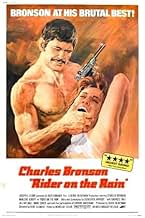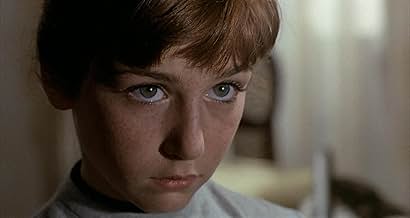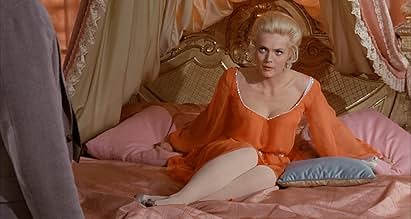Le passager de la pluie
NOTE IMDb
6,6/10
4 k
MA NOTE
Un colonel de l'armée américaine en France tente de retrouver un délinquant sexuel en cavale.Un colonel de l'armée américaine en France tente de retrouver un délinquant sexuel en cavale.Un colonel de l'armée américaine en France tente de retrouver un délinquant sexuel en cavale.
- Récompenses
- 2 victoires et 2 nominations au total
Yves Massard
- Armand's Henchman
- (as Yves Massart)
Histoire
Le saviez-vous
- AnecdotesThe 1971 song by The Doors "Riders on the Storm" was reputedly influenced by this film. Jim Morrison allegedly was so taken in by the film and in particular its plot that he wrote the song as a result.
- GaffesIn the beginning of the film, the bus is seen passing by and then stopping with no one on board, yet when the bus drives off, the stranger with the red flight bag is seen at the bus stop.
- Citations
Col. Harry Dobbs: You expect me to eat that?
Mélancolie Mau: Americans live on ketchup and milk. I'm a whiz at geography.
- Versions alternativesThe film was shot twice, once with the cast speaking English and once with them speaking French, which the French version running just over two minutes longer despite having no additional scenes. The UK DVD released by Optimum includes both cuts of the film.
- ConnexionsFeatured in Discovering Film: Charles Bronson (2015)
Commentaire à la une
Here are some background facts about Rider on the Rain -it's my all-time favorite: I saw it many times in Philly during its initial release and bought a 16mm print from Avco Embassy in the '70s to study it, doing a shot-by-shot analysis.
CLEMENT: Director René Clément, an avowed Hitchcock admirer, in a book of essays about his own work (unfortunately never translated from French) stressed the importance of detail -little items of design, recurring motifs, repeated camera moves, as the essence of his cinema. Repeated viewings of Rider reward one with these carefully set up details that go beyond the usual surface effects (without Spoilers, watch for the shtick with the walnuts, subtle camera moves, and esp. the careful obscuring or revealing of objects in the frame, e.g., by the bus early on, or the camera angles of the body removal scene). He was a master director, winning 2 Foreign Film Oscars with diverse classics including Gervaise, Forbidden Games, Purple Noon, Battle of the Rails, Monsieur Ripois and The Walls of Malapaga, as well as one ripe for rediscovery -The Sea Wall. His love of detail is on full display in Jean Cocteau's Beauty and the Beast (Clément was technical adviser). It's no coincidence that the mysterious title character in Rider is named Mac Guffin as a Hitchcock nod, well-played by the sinister Marc Mazza.
JAPRISOT: The screenwriter, whose pen name was an anagram of his real moniker, based this script on Lewis Carroll's Alice's Adventures in Wonderland, opening the film with a perfect table-setting quote: Either the well was too deep, or she fell very slowly..., which explains heroine Mellie's adventure to come. Known for A Very Long Engagement, his other recommended films include the very clever Isabelle Adjani thriller One Deadly Summer, and the very odd film of his novel The Lady in the Car with Glasses and a Gun, directed by Anatole Litvak. Lady features perhaps the longest flashback scene used as an explanation in a film's denouement, even outdoing the flashbacks that were the basis of the Barry Newman TV series Petrocelli or even the current Lost series.
BRONSON: Rider was a key film in Charles Bronson's career -a huge hit all over Europe and his breakthrough as a star, after gaining int'l success in ensemble casts for Once Upon a Time in the West and The Dirty Dozen, as well as Far East popularity opposite Alain Delon in So Long, Friend. His name in the cast is Col. Dobbs, but on the soundtrack and colloquially in France his character was known just as The American (see soundtrack LP for The American's Theme), becoming something of an iconic figure. His assurance, mysterious manner and (as Charles Laughton once praised him) great presence/center of gravity on screen add immeasurably to the film. I met him once in NYC while interviewing Michael Winner during the filming of a Death Wish sequel, and Bronson at the time was planning to do an American remake of Rider on the Rain for Cannon Films but it never happened. For the French language version of Rider his role was dubbed by expatriate blacklisted director John Berry, and there has always been a debate over the value of the French vs. English soundtrack version of Rider (Bronson dubbed vs. rest of cast dubbed; analogous to Burt Lancaster in the 2 versions of Visconti's The Leopard).
JOBERT: Marlene Jobert was the most popular gamin actress in France at the time, having starred in L'Astragale (a remarkable true story adapted from the novel by the woman who lived it, Albertine Sarrazin), and went on to make unsuccessful international films but one classic, Maurice Pialat's We Won't Grow Old Together, which I saw at the NY Film Festival with her in attendance. She is central to Rider's success and was lauded by Judith Crist in a rave review when it came out. There is a great scene near the end of the film with plenty of Alice in Wonderland atmosphere when she is taken by prostitute Marika Green to see Corinne Marchand (the iconic French actress/chanteuse of Varda's Cleo from 5 to 7), in which Clément makes great effect of the height differential between the women. Jobert met and married Marika's brother Walter and their daughter is French star Eva Green of James Bond fame, an interesting followup to the Rider casting. Another more famous singer, Belgian star Annie Cordy, plays Jobert's mother in Rider, and it spring-boarded her acting career.
FRANCIS LAI: The soundtrack album (well worth hunting for) enshrines one of Lai's best and for me most memorable scores, truly indispensable to amplifying the strange, rainy day, off-season in a Riviera resort town mood of this unique film. Best known at the time for his A Man and a Woman score, he did Love Story soon after Rider.
SERGE SILBERMAN: The producer of Rider was a great filmmaker, now little remembered (outside of France) since his death. I got to interview him during one of his lesser efforts, filming James Toback's Exposed with Rudolf Nureyev in NYC (I appear unpaid as an extra in that film, one even Toback booster Pauline Kael couldn't love). Besides the 5 later films of Luis Bunuel he produced, Silberman has his share of other all-time classics as producer, not by accident: Melville's Bob le flambeur, Jacques Becker's Le Trou, Beineix's Diva and Kurosawa's Ran. It's an amazing track record spanning a career of only a couple dozen films.
CLEMENT: Director René Clément, an avowed Hitchcock admirer, in a book of essays about his own work (unfortunately never translated from French) stressed the importance of detail -little items of design, recurring motifs, repeated camera moves, as the essence of his cinema. Repeated viewings of Rider reward one with these carefully set up details that go beyond the usual surface effects (without Spoilers, watch for the shtick with the walnuts, subtle camera moves, and esp. the careful obscuring or revealing of objects in the frame, e.g., by the bus early on, or the camera angles of the body removal scene). He was a master director, winning 2 Foreign Film Oscars with diverse classics including Gervaise, Forbidden Games, Purple Noon, Battle of the Rails, Monsieur Ripois and The Walls of Malapaga, as well as one ripe for rediscovery -The Sea Wall. His love of detail is on full display in Jean Cocteau's Beauty and the Beast (Clément was technical adviser). It's no coincidence that the mysterious title character in Rider is named Mac Guffin as a Hitchcock nod, well-played by the sinister Marc Mazza.
JAPRISOT: The screenwriter, whose pen name was an anagram of his real moniker, based this script on Lewis Carroll's Alice's Adventures in Wonderland, opening the film with a perfect table-setting quote: Either the well was too deep, or she fell very slowly..., which explains heroine Mellie's adventure to come. Known for A Very Long Engagement, his other recommended films include the very clever Isabelle Adjani thriller One Deadly Summer, and the very odd film of his novel The Lady in the Car with Glasses and a Gun, directed by Anatole Litvak. Lady features perhaps the longest flashback scene used as an explanation in a film's denouement, even outdoing the flashbacks that were the basis of the Barry Newman TV series Petrocelli or even the current Lost series.
BRONSON: Rider was a key film in Charles Bronson's career -a huge hit all over Europe and his breakthrough as a star, after gaining int'l success in ensemble casts for Once Upon a Time in the West and The Dirty Dozen, as well as Far East popularity opposite Alain Delon in So Long, Friend. His name in the cast is Col. Dobbs, but on the soundtrack and colloquially in France his character was known just as The American (see soundtrack LP for The American's Theme), becoming something of an iconic figure. His assurance, mysterious manner and (as Charles Laughton once praised him) great presence/center of gravity on screen add immeasurably to the film. I met him once in NYC while interviewing Michael Winner during the filming of a Death Wish sequel, and Bronson at the time was planning to do an American remake of Rider on the Rain for Cannon Films but it never happened. For the French language version of Rider his role was dubbed by expatriate blacklisted director John Berry, and there has always been a debate over the value of the French vs. English soundtrack version of Rider (Bronson dubbed vs. rest of cast dubbed; analogous to Burt Lancaster in the 2 versions of Visconti's The Leopard).
JOBERT: Marlene Jobert was the most popular gamin actress in France at the time, having starred in L'Astragale (a remarkable true story adapted from the novel by the woman who lived it, Albertine Sarrazin), and went on to make unsuccessful international films but one classic, Maurice Pialat's We Won't Grow Old Together, which I saw at the NY Film Festival with her in attendance. She is central to Rider's success and was lauded by Judith Crist in a rave review when it came out. There is a great scene near the end of the film with plenty of Alice in Wonderland atmosphere when she is taken by prostitute Marika Green to see Corinne Marchand (the iconic French actress/chanteuse of Varda's Cleo from 5 to 7), in which Clément makes great effect of the height differential between the women. Jobert met and married Marika's brother Walter and their daughter is French star Eva Green of James Bond fame, an interesting followup to the Rider casting. Another more famous singer, Belgian star Annie Cordy, plays Jobert's mother in Rider, and it spring-boarded her acting career.
FRANCIS LAI: The soundtrack album (well worth hunting for) enshrines one of Lai's best and for me most memorable scores, truly indispensable to amplifying the strange, rainy day, off-season in a Riviera resort town mood of this unique film. Best known at the time for his A Man and a Woman score, he did Love Story soon after Rider.
SERGE SILBERMAN: The producer of Rider was a great filmmaker, now little remembered (outside of France) since his death. I got to interview him during one of his lesser efforts, filming James Toback's Exposed with Rudolf Nureyev in NYC (I appear unpaid as an extra in that film, one even Toback booster Pauline Kael couldn't love). Besides the 5 later films of Luis Bunuel he produced, Silberman has his share of other all-time classics as producer, not by accident: Melville's Bob le flambeur, Jacques Becker's Le Trou, Beineix's Diva and Kurosawa's Ran. It's an amazing track record spanning a career of only a couple dozen films.
Meilleurs choix
Connectez-vous pour évaluer et suivre la liste de favoris afin de recevoir des recommandations personnalisées
- How long is Rider on the Rain?Alimenté par Alexa
Détails
Box-office
- Montant brut aux États-Unis et au Canada
- 708 382 $US
- Durée2 heures
- Mixage
- Rapport de forme
- 1.66 : 1
Contribuer à cette page
Suggérer une modification ou ajouter du contenu manquant

Lacune principale
By what name was Le passager de la pluie (1970) officially released in India in English?
Répondre



























